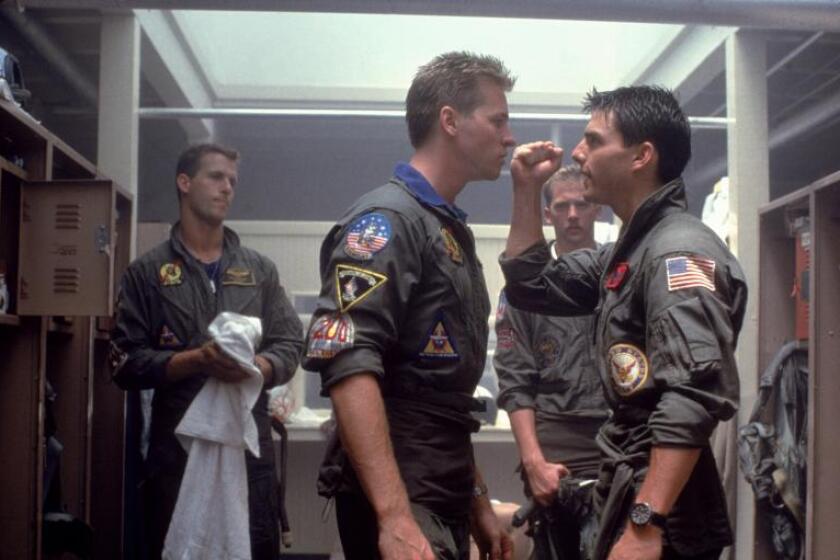MOVIE REVIEW : Tepid ‘Cocktail’ for Two Flashy Performers
- Share via
Arm wrestling and hamburger building have been exhausted as backgrounds for movies, so it was probably inevitable that bartending would be next. But nothing quite prepares you for the hamburger that “Cocktail” (citywide) makes of an old and relatively honorable profession.
Tom Cruise plays Brian Flanagan, whose dreams of high-powered jobs in advertising, banking, stockbroking or what-have-you are shattered by his lack of anything beyond a high school diploma. He settles, finally, for bartending in Manhattan, under the wing of Douglas Coughlin (the magnetic Bryan Brown). It leaves Flanagan’s days free for business courses at City College, where he daydreams about the hot franchise that will become his ticket to shopping mall superstardom: a string of bars called Cocktails and Dreams.
In the meantime, Coughlin passes on his own raunchy tips on womankind, and the two men perfect their flashy act as liquor’s dynamic duo. Suddenly “Cocktail” becomes the “Saturday Night Fever” of bartending. Cruise even gets his own bartending solo: juggling bottles, tossing ice and cocktail shakers behind his back, doing tidy little spins and discreet foot movements, all the while twinkling, twinkling, twinkling until his dimples must have ached.
The pairing of old-hand Brown and young-hand Cruise may have been meant to remind us of Cruise and Paul Newman; if so, think of this as “The Color of Counterfeit Money.”
Unfortunately, none of the film makers, including director Roger Donaldson and writer Heywood Gould, seemed to notice that young Flanagan, climber-user-apologist extraordinaire, lacked a little something as the hero of the piece. Charm, alas, doesn’t fill a moral vacuum, but the film never suggests that he’s meant to be an anti-hero, a Sammy Glick, a Duddy Kravitz. And setting him in a series of “fabulous” smoke-dense bars from Manhattan to Jamaica, where alcohol and wall-to-wall casual sex are the prime ingredients, is hardly in the spirit of the ‘80s, to put it gently. (No sympathy for Gould, who did the radical overhaul of his densely characterized, knowledgeable light novel himself.)
(The film makers may have had their first clue to the depth of feeling that “Cocktail” can generate when, during a press and public screening Monday night, the audience hissed and hooted at Flanagan’s dumber rationalizations for his actions.)
Both men marry, or try to marry for money. The satin-smooth Coughlin makes it first, marrying what is supposed to be a heavily moneyed New York lady (Kelly Lynch). To an untrained eye she may look like third from the end at Caesar’s Palace, but who are we to question the dress code of the rich and famous? Flanagan tries hard, throwing over a charming, impecunious young artist (“Adventures in Babysitting’s” Elisabeth Shue) in favor of a rich, slightly older and far more bossy Manhattanite (Lisa Banes), and letting her move him from Jamaica back to New York.
Then the plot shifts to becomes a Cinderella story intertwined with soap opera with an overlay of the most egregious melodrama. The barroom banter, written with a halfway good ear for contemporary patter, gives way to Flanagan, explaining some of his more oafish behavior to his lady-love by saying that “If a guy lays down a dare, you gotta take it.” Even the mostly young, mostly yuppie audience gagged on that one.
Bryan Brown, an actor with almost cast-iron charisma, somehow slides out of this one unscathed. Shue and Cruise wrinkle and twinkle at one another endlessly. It will probably not harm her career, and his has little to do with acting at this point anyway. J. Peter Robinson’s musical score, much of it with a strong Jamaican flavor, is first-rate, and Mel Bourne’s production design makes these glitzy watering holes seem horribly real.
“Cocktail” may seem a retreat for Donaldson, whose “No Way Out” had more than its share of sharp human touches and an almost tangible sensuality. Every director has to have one of these at one time or another; one can only wish Donaldson a less blatantly calculated project next time and a healing case of amnesia.
More to Read
Only good movies
Get the Indie Focus newsletter, Mark Olsen's weekly guide to the world of cinema.
You may occasionally receive promotional content from the Los Angeles Times.










